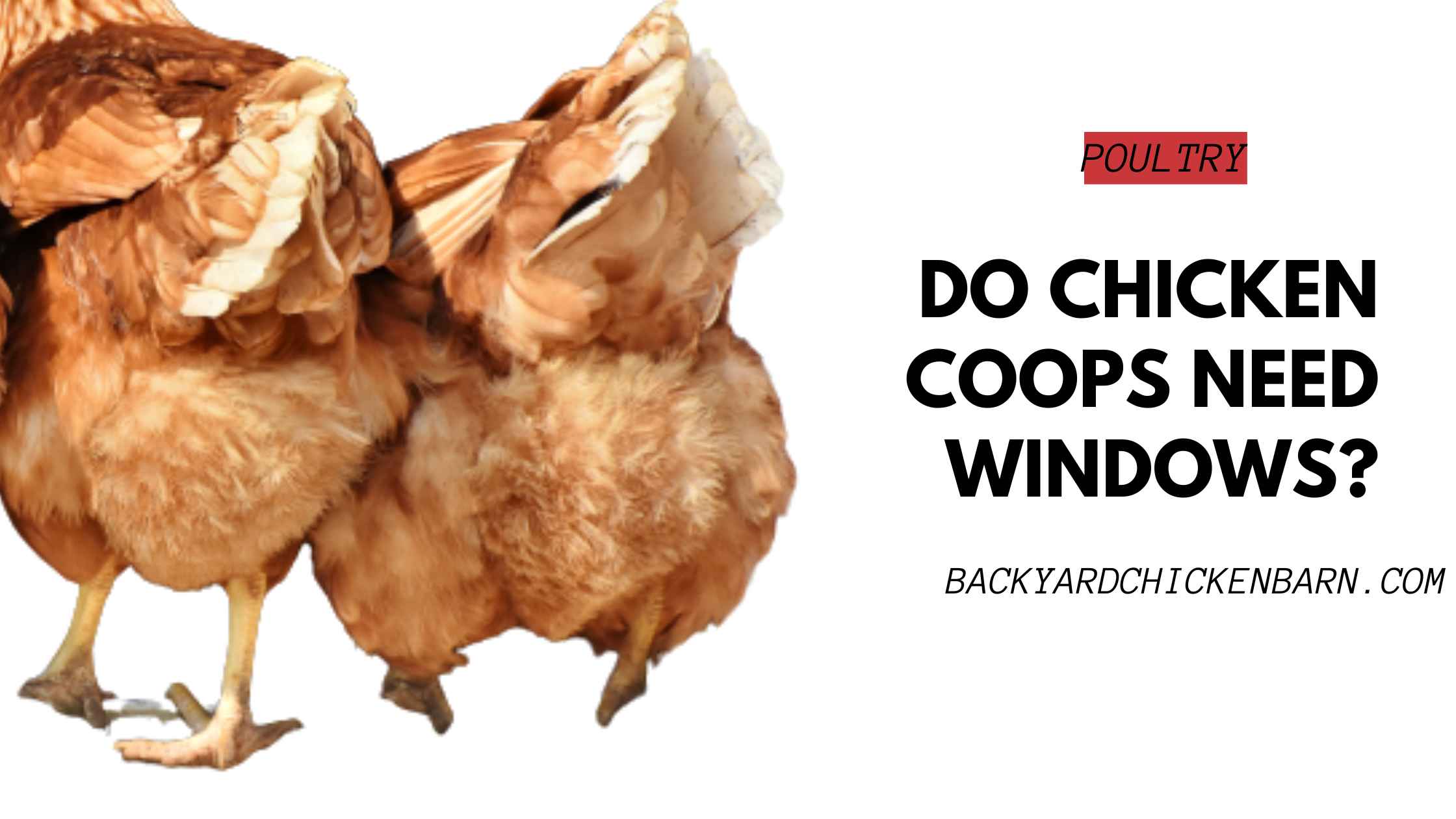Do Chicken Coops Need Windows? [LEARN MORE]
I vividly recall the day I decided to embark on my poultry-keeping journey. The enthusiasm, the anticipation, and, most notably, the whirlwind of decisions I needed to make.
One question that particularly stumped me was: Do chicken coops need windows? Fast forward to today, after countless hours of research, experiences, and interactions with fellow poultry enthusiasts, I have a clearer perspective.
Let me shine some light (pun intended!) on the subject.
1. Natural Light is a Game-Changer
My first foray into chicken keeping was with a windowless coop. I noticed a decline in egg production and later learned that chickens, like us, have a circadian rhythm influenced by natural light.
Windows can ensure they get the 14-16 hours of light typically needed for optimum egg production.
2. Ventilation is Vital
Chickens produce moisture through their respiration and droppings. With my windowless coop, the moisture buildup was evident, often leading to an ammonia smell.
Windows, when designed to open, can significantly improve ventilation, keeping the coop dry and reducing the risk of respiratory illnesses.
3. Regulating Temperature
During one scorching summer, I was alarmed to find my hens panting and stressed. A window could have made all the difference.
By providing shade yet allowing air circulation, windows can help keep the coop cooler in the heat and warmer during cold spells when coupled with appropriate insulation.
4. A View to the Outside World
Imagine being cooped up (yes, another pun) without a view of the world. Chickens are curious creatures.
Windows offer them a connection to the outside, reducing boredom and possible aggressive behaviors borne from confinement.
5. Predator Deterrence
In my earlier days, I was met with the misfortune of a predator scare. I later learned that a well-lit coop can deter nighttime predators.
The illumination can make it challenging for predators like raccoons or foxes to approach undetected.
6. Design Aesthetics
Beyond the practical reasons, windows can elevate a coop’s aesthetic appeal. When I finally added windows to my coop, not only did it benefit my flock, but it also transformed the coop into a charming little cottage in my backyard.
7. Potential Pitfalls
However, it wasn’t all rosy. Windows can sometimes be a weak point, making coops vulnerable to crafty predators. It became essential for me to ensure they were securely latched and, where necessary, reinforced with predator-proof mesh.
In conclusion, while it’s feasible to raise chickens in a windowless coop, introducing windows offers myriad benefits. They can enhance the health, productivity, and overall well-being of the flock.
From my experience, if done right, windows can be a valuable addition to any chicken coop. After all, happy hens lay the best eggs!
ALSO SEE: Where to Get a Frame Chicken Coop for Sale

FAQs on Windows in Chicken Coops
1. Why should I consider adding windows to my chicken coop? Windows provide natural light, which can boost egg production, and ensure proper ventilation, which maintains the coop’s health and hygiene.
2. How does natural light affect egg production? Chickens need 14-16 hours of light for optimum egg production. Natural light helps maintain their circadian rhythm, promoting consistent laying.
3. What’s the role of windows in ventilation? Windows, when opened, allow air to circulate, reducing moisture buildup and any associated ammonia smell, ensuring the coop remains dry.
4. Can a coop without windows harm chickens in the summer? Yes. Without proper ventilation and airflow, a coop can become excessively hot, causing heat stress to the chickens.
5. Do chickens get bored inside the coop? Chickens are naturally curious. A window provides them with a view, reducing boredom and associated aggressive behaviors.
6. How can windows deter predators? A well-lit coop, due to windows, can make it harder for nocturnal predators like raccoons or foxes to approach unnoticed.
7. Do windows enhance the look of a chicken coop? Certainly! Beyond their practical benefits, windows can elevate the aesthetic appeal of the coop, giving it a cottage-like charm.
8. Are there any downsides to having windows in a coop? Potential vulnerabilities can arise from windows, as some predators might try to exploit them. Secure latching and reinforcement are essential.
9. How many windows should my coop have? It varies based on coop size, but ensuring adequate light and ventilation without causing excessive drafts is key.
10. Can windows help during cold weather? Yes, when coupled with proper insulation, windows can allow sunlight to warm the coop while still providing ventilation.
11. How do I secure my coop windows against predators? Secure latches and predator-proof mesh or hardware cloth can be effective deterrents.
12. What kind of windows are best for coops? Windows that can be securely latched and opened for ventilation are ideal. Durable materials that withstand weather are a plus.
13. Can windows be added to an existing coop? Absolutely! With some tools and a bit of know-how, windows can be introduced to pre-existing structures.
14. How do windows reduce the ammonia smell in coops? Windows improve ventilation, reducing moisture buildup from chicken respiration and droppings, thus minimizing the ammonia odor.
15. Can I use any mesh for window protection? It’s advisable to use predator-proof mesh or hardware cloth, as these materials are more durable and offer better protection than regular mesh.
16. Do windows need to be opened daily? Depending on the weather and ventilation needs, windows can be adjusted accordingly. It’s essential to ensure consistent airflow.
17. Can I use tinted windows for my chicken coop? Tinted windows can reduce the intensity of sunlight, but ensure they don’t overly darken the coop or reduce the benefits of natural light.
18. What’s the ideal size for chicken coop windows? The size should be proportionate to the coop, ensuring adequate light and ventilation without causing excessive drafts or vulnerabilities.
19. Do windows contribute to chicken happiness? Providing a view to the outside world can reduce chicken boredom and stress, contributing to their overall well-being.
20. Are sliding windows suitable for chicken coops? Sliding windows can be used as long as they provide adequate ventilation and can be secured against potential predators.
21. How do I clean the coop windows? Just as you’d clean household windows—using water, a mild detergent, and a soft cloth or sponge.
22. Do windows impact the structural integrity of the coop? If properly installed, windows should not compromise the coop’s integrity. Ensure they’re well-framed and supported.
23. Should windows be placed at a specific height in the coop? Placing them at a height that prevents direct drafts on the chickens but still allows light and air is ideal.
24. Can windows be automated to open or close? Yes, with some technological integrations, windows can be automated based on temperature or time.
25. What materials are best for coop window frames? Durable materials like treated wood or metal that can withstand weather elements are recommended.
26. Do chickens have a preference for light? Chickens naturally wake with sunrise and settle at dusk. Consistent natural light aligns with their inherent rhythms.
27. Can I use old house windows for my coop? Repurposing old house windows can be both economical and environmentally friendly, as long as they’re in good condition and offer the necessary benefits.
28. How does light influence the chickens’ sleep cycle? Chickens generally roost and sleep as it gets dark. Natural light helps maintain a regular sleep-wake cycle.
29. Should I use curtains or blinds with coop windows? While not necessary, they can be useful for regulating light or protecting chickens from direct sunlight or harsh weather.
30. Are coop windows expensive to install? The cost varies based on window type and installation. DIY solutions or upcycling can be cost-effective.
31. Do coop windows need to be double-glazed? While not essential, double-glazing can provide better insulation in colder climates.
32. Can windows help during molting seasons? Yes, adequate light can help regulate chickens’ physiological processes, including molting.
33. Is there a risk of chickens flying out of open windows? If the windows are large and low, there’s a potential risk. Installing secure mesh can prevent any adventurous escapes.
34. How often should coop windows be inspected? Regularly checking for wear, tear, and potential vulnerabilities is advised, at least once every few months or seasonally.
35. Can windows be sealed during extreme weather? Yes, if extreme conditions warrant it, windows can be temporarily sealed, but ensure some ventilation is maintained.
36. Can UV protective films be used on coop windows? Yes, if you’re concerned about excessive sunlight, UV films can be a solution.
37. Are there any paints or treatments to protect wooden window frames? Non-toxic paints or weather-resistant treatments can prolong the life of wooden frames.
38. Can mirrors substitute for windows in chicken coops? While mirrors can provide entertainment for chickens, they don’t offer the light and ventilation benefits of windows.
39. Do windows affect the acoustics inside a chicken coop? Generally, windows shouldn’t significantly impact acoustics. However, ensuring tight seals can minimize external noise.
40. How do I decide the best placement for windows in the coop? Consider the sun’s trajectory, weather conditions, and the coop’s layout. Ideally, windows should provide ample light without causing overheating or direct drafts on the chickens.


